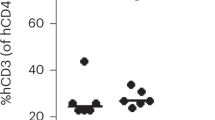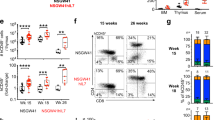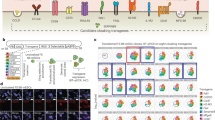Abstract
BURNET'S suggestion that self tolerance was gained during foetal life by elimination of self reactive clones of lymphocytes1 has gained support from studies with lymphoid chimaeras prepared by injection of either foetal or neonatal animals with histoincompatible spleen cells2; by injection of irradiated adult F1 hybrid mice with parental-type bone marrow cells3, or by fusion of eight-cell-stage embryos4. However, in some situations active suppression by blocking factors5 or by suppressor T cells6 may account for the lack of reactivity in apparently tolerant animals, although it is likely that these mechanisms operate only when tolerance is incompletely induced7. We describe here an in vitro model for the study of transplantation tolerance and offer evidence that active suppression by regulatory T cells is not involved. Unresponsiveness to mixed lymphocyte culture (MLC)-stimulating determinants on histoincompatible cells was induced in foetal murine thymocytes in organ culture by incubation of foetal thymus, of 14-d gestation, in contact with mitomycin-treated fragments of adult allogeneic spleen (Fig. 1).
This is a preview of subscription content, access via your institution
Access options
Subscribe to this journal
Receive 51 print issues and online access
$199.00 per year
only $3.90 per issue
Buy this article
- Purchase on Springer Link
- Instant access to full article PDF
Prices may be subject to local taxes which are calculated during checkout
Similar content being viewed by others
References
Burnet, F. M. Cellular Immunology (Melbourne University Press, 1969).
Elkins, W. L. J. exp. Med. 137, 1097–1102 (1973).
Boehmer, H. von & Sprent, J. Transplant. Rev. 29, 3–23 (1976).
Barnes, R. D. J. Immunogenet. 3, 347–356 (1976).
Droege, W. & Mayor, K. Transplantation 19, 517–519 (1975).
Kilshaw, P. J., Brent, L. & Pinto, M. Nature 255, 489–491 (1975).
Beverley, P. C. L., Brent, L., Brooks, C. G., Medawar, P. B. & Simpson, E. Transplant. Proc. 5, 679–684 (1973).
Robinson, J. H. & Owen, J. J. T. Clin. exp. Immun. 27, 322–327 (1977).
Rich, R. R. & Rich, S. S. J. exp. Med. 140, 1588–1603 (1974).
Metcalf, E. S. & Klinman, N. R. J. exp. Med. 143, 1327–1340 (1976).
Elson, C. J. Eur. J. Immun. 7, 6–10 (1977).
Kuperman, D. J. & Bach, F. H. J. exp. Med. 143, 1545–1550 (1976).
Brooks, C. G. Eur. J. Immun. 5, 741–747 (1975).
Author information
Authors and Affiliations
Rights and permissions
About this article
Cite this article
ROBINSON, J., OWEN, J. Transplantation tolerance induced in foetal mouse thymus in vitro. Nature 271, 758–760 (1978). https://doi.org/10.1038/271758a0
Received:
Accepted:
Published:
Issue Date:
DOI: https://doi.org/10.1038/271758a0
This article is cited by
-
Does T-cell tolerance require a dedicated antigen-presenting cell?
Nature (1989)
-
Identity of cells that imprint H–2-restricted T-cell specificity in the thymus
Nature (1986)
-
Susceptibility genetics of systemic lupus erythematosus
Springer Seminars in Immunopathology (1986)
-
Induction of MHC-restricted specificity and tolerance in the thymus
Immunologic Research (1986)
-
The cellular immunology of myasthenia gravis
La Ricerca in Clinica e in Laboratorio (1985)
Comments
By submitting a comment you agree to abide by our Terms and Community Guidelines. If you find something abusive or that does not comply with our terms or guidelines please flag it as inappropriate.



